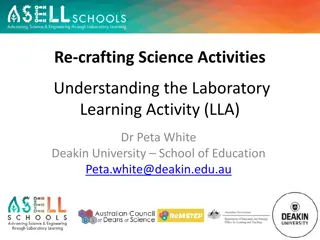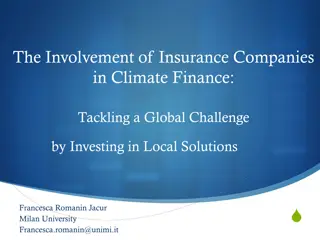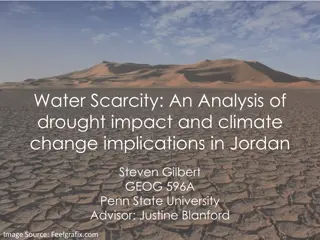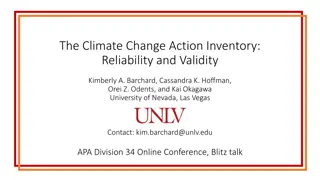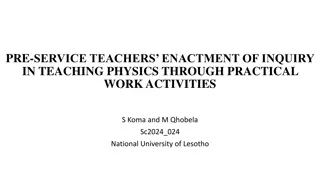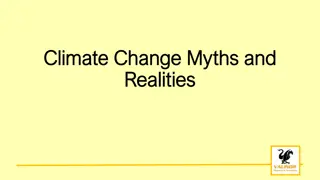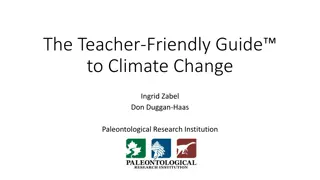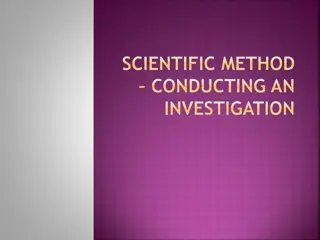Understanding Climate Change through Scientific Inquiry
Explore the role of science in addressing climate change, identifying scientific questions, discussing different disciplines involved, and analyzing the strength and limitations of scientific methods. Engage in activities to understand how scientific questions are formulated and categorized for investigation, particularly in relation to greenhouse gases and global warming.
Download Presentation

Please find below an Image/Link to download the presentation.
The content on the website is provided AS IS for your information and personal use only. It may not be sold, licensed, or shared on other websites without obtaining consent from the author. Download presentation by click this link. If you encounter any issues during the download, it is possible that the publisher has removed the file from their server.
E N D
Presentation Transcript
Thinking insightfully about climate change and science www.epistemicinsight.com LASAR@canterbury.ac.uk
Objectives Identify questions that are amenable to science List the different disciplines that inform an example big question Explain the strength and limitations of science www.epistemicinsight.com LASAR@canterbury.ac.uk
Starter What information can you get from the graph? Global temperature has continually increased since the late 1930s. The biggest rate of increase is seen in the last 5-10 years. www.epistemicinsight.com LASAR@canterbury.ac.uk Identify questions that are amenable to science
Lets think about science for a second What makes a question a science question ? What features does a science question have? 2 minutes to discuss in a group www.epistemicinsight.com LASAR@canterbury.ac.uk Identify questions that are amenable to science
The Bubble Tool Note: Amenable=suited to The bubble tool helps us group questions according to how well they can be answered using science alone www.epistemicinsight.com LASAR@canterbury.ac.uk Identify questions that are amenable to science
How scientific are the following questions? Where would you place them in the bubble tool? What causes global warming? How do greenhouse gases cause global warming? Ammenable Partly Big question Ammenable How do we respond to the climate crisis? What are the products of combustion? www.epistemicinsight.com LASAR@canterbury.ac.uk Identify questions that are amenable to science
How do greenhouse gases cause global warming? What makes this question/problem amenable to science? Properties and behaviour of natural objects gases Conducting experiments and making observations testing chemical properties of gases in a laboratory Proving effectiveness objectively and predicting how things will behave creating a model for the impact on atmosphere For these reasons, science is very amenable to questions about gases and their effects on the atmosphere www.epistemicinsight.com LASAR@canterbury.ac.uk Identify questions that are amenable to science
Introducing the confidence ruler. Introducing the confidence ruler. In the upcoming slides, you are going to be asked to rank how confident you are that the conclusions made are true. Higher numbers mean you are more confident www.epistemicinsight.com LASAR@canterbury.ac.uk Identify questions that are amenable to science
Rank your confidence on the confidence ruler. Increasing levels of carbon dioxide is causing the temperature of the earth to increase. Rising temperatures in the earth are causing sea levels to rise. www.epistemicinsight.com LASAR@canterbury.ac.uk Identify questions that are amenable to science
Rank your confidence on the confidence ruler. The more cheese you eat, the more likely you are to die from being tangled in a bedsheet when you sleep. www.epistemicinsight.com LASAR@canterbury.ac.uk Identify questions that are amenable to science
Rank your confidence on the confidence ruler. The more films Nicoholas cage appears in each year, the more people drown in swimming pools. www.epistemicinsight.com LASAR@canterbury.ac.uk Identify questions that are amenable to science
Did you give 100% confidence for any statement? Why/ why not? What would cause you to have greater confidence www.epistemicinsight.com LASAR@canterbury.ac.uk Identify questions that are amenable to science
The discipline wheel Big questions are questions that require more than one subject to give a complete answer. The discipline wheel identifies the different subjects that contribute to a complete answer Although science can tell you about the impact of the crash in the titanic, why the captain took the actions he did, the role of the media, trying to get a world record, all inform why the titanic sank. www.epistemicinsight.com LASAR@canterbury.ac.uk List the different disciplines that inform an example big question
A big question: How do we reduce emissions of climate change? Climate change A very complex real-world problem A big question: How do we reduce emissions of climate change? www.epistemicinsight.com LASAR@canterbury.ac.uk List the different disciplines that inform an example big question
A big question:How can we reduce emissions of greenhouse gases? How can we reduce emissions of greenhouse gases? You are going to imagine you are the chair of the Climate Change Committee, the group who advise the government on their climate policies www.epistemicinsight.com LASAR@canterbury.ac.uk List the different disciplines that inform an example big question
How can we reduce emissions of greenhouse gases? Unpack the question! Make a short list of some issues and questions that should go on the agenda for your meeting www.epistemicinsight.com LASAR@canterbury.ac.uk List the different disciplines that inform an example big question
Which disciplines help answer my big question? Suggested disciplines for wheel Science Economics The arts Ethics Design and Technology Geography Psychology Sociology Religious studies Business studies Now, looking at your list consider: Which discipline s experts would you invite to your committee to address these questions and issues? www.epistemicinsight.com LASAR@canterbury.ac.uk List the different disciplines that inform an example big question
Construct your discipline wheel. Which subjects do you include and why? Big question: How do we reduce emissions of greenhouse gasses. Put this big question on the sticky note and list the disciplines you wish to include in the surrounding boxes. www.epistemicinsight.com LASAR@canterbury.ac.uk List the different disciplines that inform an example big question
Rank your disciplines by importance Now, having considered all this, rank the disciplines in order of importance for answering the overall question. How can we reduce emissions of greenhouse gases? Did each group decide on the same ranking? Is there a correct answer? www.epistemicinsight.com LASAR@canterbury.ac.uk Explain the strength and limitations of science
Pick your top 3 and explain why you put them in that order Why did you place science where you did? If it was top, why? If not, why not? www.epistemicinsight.com LASAR@canterbury.ac.uk Explain the strength and limitations of science
Consider this quote: I used to think that top environmental problems were biodiversity loss, ecosystem collapse and climate change I was wrong. The top environmental problems are selfishness, greed and apathy, and to deal with these we need a cultural and spiritual transformation. (James Speth) MENTI Do you agree? Why/why not? www.epistemicinsight.com LASAR@canterbury.ac.uk Explain the strength and limitations of science
Exit ticket What big question would you like to investigate What are the sub questions that are amenable to science? www.epistemicinsight.com LASAR@canterbury.ac.uk


